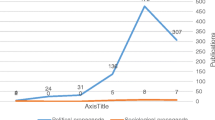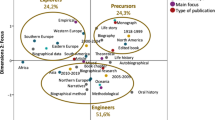Abstract
In its efforts to direct thought and with the help of technological developments that allow it to spread more easily and quicker than ever before, propaganda has become a dominant feature of modern societies. This article analyzes the development of propaganda research using bibliometric methods for the first time. The question asked is whether propaganda can be considered an autonomous research field, in view of the course of its development as indicated by the number of publications and citations made in this area. We argue that while propaganda plays a very important role in our lives, propaganda cannot be considered an autonomous field of research, despite the seemingly growing number of publications in this field over the period we examined (1965–2019).

Similar content being viewed by others
References
Bartlett, F. (1940). Political propaganda. Cambridge: Cambridge University Press.
Bernays, E. (2005 (1928)). Propaganda. New York: IG Publishing.
Chomsky, N. (2002). Media control. The spectacular achievements of propaganda. New York: Seven Stories Press.
Ellul, J. (1973). Propaganda. The formation of men’s attitudes. New York: Vintage Books.
Fraser, L. (1957). Propaganda. Oxford: Oxford University Press.
Huxley, A. (1936). Notes on propaganda. Harper’s Magazine, 174, 32–41.
Joannidis, J. P. A. (2014). Is your most cited work your best? Nature,514, 561.
Lasswell, H. (1935). The person: Subject and object of propaganda. Annals of the American Academy of Political and Social Science,179, 187–193.
Marlin, R. (2002). Propaganda and the ethics of propaganda. New York: Broadview Press.
Martin, E. D. (1932). The conflict of the individual and the mass in the modern world. New York: Henry Holt.
Martin, R. L., Martin, R. I., & Nunez, P. (2018). Propaganda and education. Study of propaganda in the Spanish educational history (1900–1975). Etic Net-Revista Cientifica Electronica de Educacion y Comunicacion en la Sociedad del Conocimiento,18(1), 133–172.
Meadows, A. J. (1998). Communicating science. San Diego: Academic Press.
Qualter, T. (1965). Propaganda and psychological warfare. New York: Random House.
Social Science Citation Index (2015) of the World of Science.
Sproul, J. M. (1987). Propaganda studies in American social science. The rise and fall of the critical paradigm. Quarterly Journal of Speech,73(1), 60–78.
Taylor, P. (1995). Munitions of the mind: A history of propaganda from the ancient world to the present day. Manchester: Manchester University Press.
Welch, D. (2013). Propaganda. Power and persuasion. London: I.B. Tauris & Co., Ltd.
Author information
Authors and Affiliations
Corresponding author
Rights and permissions
About this article
Cite this article
Tal, D., Gordon, A. Propaganda as a research field: a bibliometric study. Scientometrics 122, 741–750 (2020). https://doi.org/10.1007/s11192-019-03298-3
Received:
Published:
Issue Date:
DOI: https://doi.org/10.1007/s11192-019-03298-3




